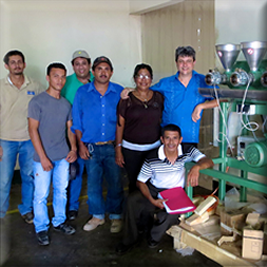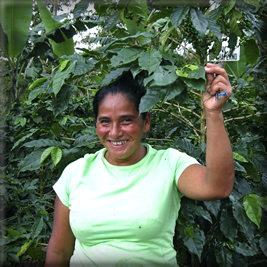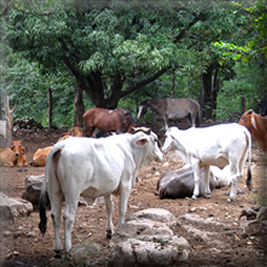Investments
Since its inception, Ético has supported small farmer cooperatives financially, through both tailored financing for export products and longer term investments to boost capital development and infrastructure. Because of our unique position in the center of the supply chain we are able to offer continuous financial support through production, processing, shipping, and storage at a product’s end destination.
Ético has individual and cooperative ethical investors who participate in our integrated supply chain, vastly improving the accessibility of financing for small farmer cooperatives. Our ethical investors receive annual reports detailing the use of funds and how they are distributed amongst the cooperatives. Their trust has made it possible for our unique social business model to establish itself.
Ético has created five investment funds: Cooperative Strategic Investment Fund, the Fair Trade Finance Fund, the Small Farmer Coffee Fund, the Women's Investment Fund, and the Small Farmer Investment Fund. These funds are managed cooperatively by Ético and the farmer's cooperatives for a variety of applications from long term capital investments in the cooperatives to individual micro-loans for farmers. Ético also offers financing for a variety of products through the entire supply chain to the consumer. The following are some examples of past investments.
Ético has individual and cooperative ethical investors who participate in our integrated supply chain, vastly improving the accessibility of financing for small farmer cooperatives. Our ethical investors receive annual reports detailing the use of funds and how they are distributed amongst the cooperatives. Their trust has made it possible for our unique social business model to establish itself.
Ético has created five investment funds: Cooperative Strategic Investment Fund, the Fair Trade Finance Fund, the Small Farmer Coffee Fund, the Women's Investment Fund, and the Small Farmer Investment Fund. These funds are managed cooperatively by Ético and the farmer's cooperatives for a variety of applications from long term capital investments in the cooperatives to individual micro-loans for farmers. Ético also offers financing for a variety of products through the entire supply chain to the consumer. The following are some examples of past investments.
Agroindustrial Development

Ético creates truly integrated supply chains that improve the livelihoods for rural communities by raising the level of ownership by farmers to include processing, storing, and importing. This is achieved through strategic investments that bring state of the art industrial technology straight into the hands of small farmers. Since its inception, Ético has supported small farmer cooperatives in successfully entering the global marketplace.
Some examples of strategic development investments include a Cupping Lab Project in 2000 that built the first 9 cupping labs ever built at origin. This pioneering project, executed together with Paul Katzeff of the Thanksgiving Coffee Company, included quality training and education at the farm level and transformed the way coffee is traded globally. The ability to "know what they grow" has brought Nicaraguan small coffee cooperatives into the top end of the specialty coffee industry and inspired similar empowering projects around the world. Ético continues to support coffee cooperatives in further improving infrastructure for processing washed and natural Arabica coffees as well as in implementing social development projects.
In 2005 Ético helped form the Del Campo Central of Cooperatives and invested in a Sesame Processing Plant, bringing together base cooperatives totalling over 1000 small farmers across Nicaragua. Del Campo has become the largest sesame exporter in Central America, processing 70% of the sesame in Nicaragua.
The cooperative has been recognized internationally for their high quality natural and hulled sesame, as well as for their traceability system and social development. Most recently Ético has facilitated funding for a state of the art oil press for the Juan Francisco Paz Silva cooperative that will increase yields and improve the energy efficiency of sesame oil production.
Some examples of strategic development investments include a Cupping Lab Project in 2000 that built the first 9 cupping labs ever built at origin. This pioneering project, executed together with Paul Katzeff of the Thanksgiving Coffee Company, included quality training and education at the farm level and transformed the way coffee is traded globally. The ability to "know what they grow" has brought Nicaraguan small coffee cooperatives into the top end of the specialty coffee industry and inspired similar empowering projects around the world. Ético continues to support coffee cooperatives in further improving infrastructure for processing washed and natural Arabica coffees as well as in implementing social development projects.
In 2005 Ético helped form the Del Campo Central of Cooperatives and invested in a Sesame Processing Plant, bringing together base cooperatives totalling over 1000 small farmers across Nicaragua. Del Campo has become the largest sesame exporter in Central America, processing 70% of the sesame in Nicaragua.
Land Ownership
In 2002, coffee producing countries across the world suffered a severe drop in the price of coffee, provoking a crisis that resulted in many unemployed plantation workers. In Nicaragua, approximately 3,000 landless coffee workers organized a march from Matagalpa to the capital city of Managua to demand government support for their starving families. Although they reached initial agreements for land, health clinics in their communities, and food aid, the government never followed through. In 2003 an established small coffee farmer cooperative, CECOCAFEN, teamed up with Ético to offer 70 families loans to purchase six coffee farms, providing those families the opportunity for stable incomes in the future as landowners. The families were able to purchase the land and formed base cooperatives that are now members of CECOCAFEN and export coffee to Europe and the U.S. through Ético. Land ownership is a vital step for a farmer in building stability and security for their family’s future. Ético’s cooperative partners offer loans to members and their children to ensure the future generations have the resources to generate income.

Family Cattle Ranching

In 2002 Ético created a revolving fund with the Juan Francisco Paz Silva Cooperative to support small farmers in Achuapa, Nicaragua to purchase cattle. The farmers used individual loans to purchase dairy and beef cattle for milk and meat production and oxen for animal traction. Cattle are popular investments for Nicaraguan campesino families because of their ability to provide steady income through the sale of milk or cheese. Through the established fund, seventeen families in the first two years were able to purchase cattle, pay back their loans, and invest the profits in their families and farms. In a small community called La Arinconada this investment project enabled 7 families living in an agricultural land cooperative to purchase 50 heads of cattle. The cooperative had just received the title to their land, and the investment in their production enabled them to continue sending their children to a nearby secondary school despite the hardship of a severe drought when they lost their corn and bean crops. Years after finalising the loan the communities of Achuapa continue to subsist on small-scale family farming and the educational opportunities for young people have much improved.




